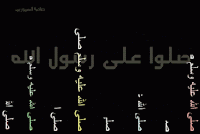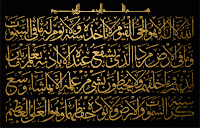Which was revealed in Makkah
﴿ بِسۡمِ ٱللَّهِ ٱلرَّحۡمَـٰنِ ٱلرَّحِيمِ ﴾
In the Name of Allah, the Most Beneficent, the Most Merciful.
﴿ عَمَّ يَتَسَآءَلُونَ • عَنِ ٱلنَّبَإِ ٱلۡعَظِيمِ • ٱلَّذِى هُمۡ فِيهِ مُخۡتَلِفُونَ • كَلَّا سَيَعۡلَمُونَ • ثُمَّ كَلَّا سَيَعۡلَمُونَ • أَلَمۡ نَجۡعَلِ ٱلۡأَرۡضَ مِهَـٰدً۬ا • وَٱلۡجِبَالَ أَوۡتَادً۬ا • وَخَلَقۡنَـٰكُمۡ أَزۡوَٲجً۬ا • وَجَعَلۡنَا نَوۡمَكُمۡ سُبَاتً۬ا • وَجَعَلۡنَا ٱلَّيۡلَ لِبَاسً۬ا • وَجَعَلۡنَا ٱلنَّہَارَ مَعَاشً۬ا • وَبَنَيۡنَا فَوۡقَكُمۡ سَبۡعً۬ا شِدَادً۬ا • وَجَعَلۡنَا سِرَاجً۬ا وَهَّاجً۬ا • وَأَنزَلۡنَا مِنَ ٱلۡمُعۡصِرَٲتِ مَآءً۬ ثَجَّاجً۬ا • لِّنُخۡرِجَ بِهِۦ حَبًّ۬ا وَنَبَاتً۬ا • وَجَنَّـٰتٍ أَلۡفَافًا ﴾
(1. What are they asking about) (2. About the great news,) (3. About which they are in disagreement.) (4. Nay, they will come to know!) (5. Nay, again, they will come to know!) (6. Have We not made the earth as a bed,) (7. And the mountains as pegs) (8. And We have created you in pairs.) (9. And We have made your sleep as a thing for rest.) (10. And We have made the night as a covering,) (11. And We have made the day for livelihood.) (12. And We have built above you seven strong,) (13. And We have made (therein) a shining lamp.) (14. And We have sent down from the Mu`sirat water Thajjaj.) (15. That We may produce therewith grains and vegetations,) (16. And gardens that are Alfaf.)
Refutation against the Idolators' Denial of the Occurrence of the Day of Judgement
In rejection of the idolators' questioning about the Day of Judgement, due to their denial of its occurrence, Allah says,
﴿ عَمَّ يَتَسَآءَلُونَ • عَنِ ٱلنَّبَإِ ٱلۡعَظِيمِ ﴾
(What are they asking about About the great news,) meaning, what are they asking about They are asking about the matter of the Day of Judgement, and it is the great news. Meaning the dreadful, horrifying, overwhelming information.
﴿ ٱلَّذِى هُمۡ فِيهِ مُخۡتَلِفُونَ ﴾
(About which they are in disagreement.) meaning, the people are divided into two ideas about it. There are those who believe in it and those who disbelieve in it. Then Allah threatens those who deny the Day of Judgement by saying,
﴿ كَلَّا سَيَعۡلَمُونَ • ثُمَّ كَلَّا سَيَعۡلَمُونَ ﴾
(Nay, they will come to know! Nay, again, they will come to know!) This is a severe threat and a direct warning.
Mentioning Allah's Power, and the Proof of His Ability to resurrect the Dead
Then, Allah begins to explain His great ability to create strange things and amazing matters. He brings this as a proof of His ability to do whatever He wishes concerning the matter of the Hereafter and other matters as well. He says,
﴿ أَلَمۡ نَجۡعَلِ ٱلۡأَرۡضَ مِهَـٰدً۬ا ﴾
(Have We not made the earth as a bed,) meaning, an established, firm and peaceful resting place that is subservient to them.
﴿ وَٱلۡجِبَالَ أَوۡتَادً۬ا ﴾
(And the mountains as pegs) meaning, He made them as pegs for the earth to hold it in place, make it stable and firm. This is so that it may be suitable for dwelling and not quake with those who are in it. Then Allah says,
﴿ وَخَلَقۡنَـٰكُمۡ أَزۡوَٲجً۬ا ﴾
(And We have created you in pairs.) meaning, male and female, both of them enjoying each other, and by this means procreation is achieved. This is similar to Allah's statement,
﴿ وَمِنۡ ءَايَـٰتِهِۦۤ أَنۡ خَلَقَ لَكُم مِّنۡ أَنفُسِكُمۡ أَزۡوَٲجً۬ا لِّتَسۡكُنُوٓاْ إِلَيۡهَا وَجَعَلَ بَيۡنَڪُم مَّوَدَّةً۬ وَرَحۡمَةًۚ ﴾
(And among His signs is this that He created for you wives from among yourselves, that you may find repose in them, and He has put between you affection and mercy.) (30:21)
﴿ وَجَعَلۡنَا نَوۡمَكُمۡ سُبَاتً۬ا ﴾
(And We have made your sleep as a thing for rest.) meaning, a cessation of movement in order to attain rest from the frequent repetition and going about in search of livelihood during the day. A similar Ayah has been mentioned previously in Surat Al-Furqan.
﴿ وَجَعَلۡنَا ٱلَّيۡلَ لِبَاسً۬ا ﴾
(And We have made the night as a covering,) meaning, its shade and darkness covers the people. This is as Allah says,
﴿ وَٱلَّيۡلِ إِذَا يَغۡشَٮٰهَا ﴾
(By the night as it conceals it.) (91:4) Qatadah commented;
﴿ وَجَعَلۡنَا ٱلَّيۡلَ لِبَاسً۬ا ﴾
(And We have made the night as a covering,) meaning, a tranquil residence. Concerning Allah's statement,
﴿ وَجَعَلۡنَا ٱلنَّہَارَ مَعَاشً۬ا ﴾
(And We have made the day for livelihood.) meaning, `We made it radiant, luminous, and shining so that the people would be able to move about in it.' By it they are able to come and go for their livelihood, earning, business dealings and other than that as well. In reference to Allah's statement,
﴿ وَبَنَيۡنَا فَوۡقَكُمۡ سَبۡعً۬ا شِدَادً۬ا ﴾
(And We have built above you seven strong,) meaning, the seven heavens in their vastness, loftiness, perfection, precision, and adornment with both stable and moving stars. Thus, Allah says,
﴿ وَجَعَلۡنَا سِرَاجً۬ا وَهَّاجً۬ا ﴾
(And We have made (therein) a shining lamp.) meaning, the radiant sun that gives light to all of the world. Its light glows for all of the people of the earth. Allah then says,
﴿ وَأَنزَلۡنَا مِنَ ٱلۡمُعۡصِرَٲتِ مَآءً۬ ثَجَّاجً۬ا ﴾
(And We have sent down from the Mu`sirat water Thajjaj.) `Ali bin Abi Talhah reported from Ibn `Abbas that he said, "From the Mu`sirat means from the clouds.'' This was also stated by `Ikrimah, Abu Al-`Aliyah, Ad-Dahhak, Al-Hasan, Ar-Rabi` bin Anas, Ath-Thawri, and it is preferred by Ibn Jarir. Al-Farra' said, "They are the clouds that are filled with rain, but they do not bring rain. This is like the woman being called Mu`sir when (the time of) her menstrual cycle approaches, yet she does not menstruate.'' This is as Allah says,
﴿ ٱللَّهُ ٱلَّذِى يُرۡسِلُ ٱلرِّيَـٰحَ فَتُثِيرُ سَحَابً۬ا فَيَبۡسُطُهُ ۥ فِى ٱلسَّمَآءِ كَيۡفَ يَشَآءُ وَيَجۡعَلُهُ ۥ كِسَفً۬ا فَتَرَى ٱلۡوَدۡقَ يَخۡرُجُ مِنۡ خِلَـٰلِهِۦۖ ﴾
(Allah is He Who sends the winds, so that they raise clouds, and spread them along the sky as He wills, and then break them into fragments, until you see rain drops come forth from their midst!) (30:48) meaning, from its midst. Concerning Allah's statement,
﴿ مَآءً۬ ثَجَّاجً۬ا ﴾
(water Thajjaj) Mujahid, Qatadah, and Ar-Rabi` bin Anas all said, "Thajjaj means poured out.'' At-Thawri said, "Continuous.'' Ibn Zayd said, "Abundant.'' In the Hadith of the woman with prolonged menstrual bleeding, when the Messenger of Allah said to her,
« أَنْعَتُ لَكِ الْكُرْسُف »
(I suggest you to make an absorbent cloth for yourself.)'' Meaning, `dress the area with cotton.' The woman replied, "O Messenger of Allah! It (the bleeding) is too much for that. Verily, it flows in profusely (Thajja).'' This contains an evidence for using the word Thajj to mean abundant, continuous and flowing. And Allah knows best. Allah said,
﴿ لِّنُخۡرِجَ بِهِۦ حَبًّ۬ا وَنَبَاتً۬ا • وَجَنَّـٰتٍ أَلۡفَافًا ﴾
(That We may produce therewith corn and vegetation, and gardens that are Alfaf.) meaning, `so that We may bring out great abundance, goodness, benefit, and blessing through this water.'
﴿ حَبًّ۬ا ﴾
(grains) This refers to that which is preserved for (the usage) of humans and cattle.
﴿ وَنَبَاتً۬ا ﴾
(and vegetations) meaning, vegetables that are eaten fresh.
﴿ وَجَنَّـٰتٍ ﴾
(And gardens) meaning, gardens of various fruits, differing colors, and a wide variety of tastes and fragrances, even if it is ingathered at one location of the earth. This is why Allah says
﴿ وَجَنَّـٰتٍ أَلۡفَافًا ﴾
(And gardens that are Alfaf.) Ibn `Abbas and other said, "Alfaf means gathered.'' This is similar to Allah's statement,
﴿ وَفِى ٱلۡأَرۡضِ قِطَعٌ۬ مُّتَجَـٰوِرَٲتٌ۬ وَجَنَّـٰتٌ۬ مِّنۡ أَعۡنَـٰبٍ۬ وَزَرۡعٌ۬ وَنَخِيلٌ۬ صِنۡوَانٌ۬ وَغَيۡرُ صِنۡوَانٍ۬ يُسۡقَىٰ بِمَآءٍ۬ وَٲحِدٍ۬ وَنُفَضِّلُ بَعۡضَہَا عَلَىٰ بَعۡضٍ۬ فِى ٱلۡأُڪُلِۚ إِنَّ فِى ذَٲلِكَ لَأَيَـٰتٍ۬ لِّقَوۡمٍ۬ يَعۡقِلُونَ ﴾
(And in the earth are neighboring tracts, and gardens of vines, and green crops, and date palms, growing into two or three from a single stem root, or otherwise, watered with the same water; yet some of them We make more excellent than others to eat. Verily, in these things there are Ayat for the people who understand.) (13:4)
﴿ إِنَّ يَوۡمَ ٱلۡفَصۡلِ كَانَ مِيقَـٰتً۬ا • يَوۡمَ يُنفَخُ فِى ٱلصُّورِ فَتَأۡتُونَ أَفۡوَاجً۬ا • وَفُتِحَتِ ٱلسَّمَآءُ فَكَانَتۡ أَبۡوَٲبً۬ا • وَسُيِّرَتِ ٱلۡجِبَالُ فَكَانَتۡ سَرَابًا • إِنَّ جَهَنَّمَ كَانَتۡ مِرۡصَادً۬ا • لِّلطَّـٰغِينَ مَـَٔابً۬ا • لَّـٰبِثِينَ فِيہَآ أَحۡقَابً۬ا • لَّا يَذُوقُونَ فِيہَا بَرۡدً۬ا وَلَا شَرَابًا • إِلَّا حَمِيمً۬ا وَغَسَّاقً۬ا • جَزَآءً۬ وِفَاقًا • إِنَّہُمۡ ڪَانُواْ لَا يَرۡجُونَ حِسَابً۬ا • وَكَذَّبُواْ بِـَٔايَـٰتِنَا كِذَّابً۬ا ﴾
﴿ وَكُلَّ شَىۡءٍ أَحۡصَيۡنَـٰهُ ڪِتَـٰبً۬ا • فَذُوقُواْ فَلَن نَّزِيدَكُمۡ إِلَّا عَذَابًا ﴾
(17. Verily, the Day of Decision is a fixed time,) (18. The Day when the Trumpet will be blown, and you shall come forth in crowds.) (19. And the heaven shall be opened, and it will become as gates.) (20. And the mountains shall be moved away from their places and they will be as if they were a mirage.) (21. Truly, Hell is a place of ambush) (22. A dwelling place for the Taghun,) (23. They will abide therein Ahqab.) (24. Nothing cool shall they taste therein, nor any drink.) (25. Except Hamim, and Ghassaq) (26. An exact recompense (according to their evil crimes).) (27. For verily, they used not to look for a reckoning.) (28. But they denied Our Ayat Kidhdhaba.) (29. And all things We have recorded in a Book.) (30. So taste you. No increase shall We give you, except in torment.)
Explaining the Day of Decision and what occurs during it
Allah says about the Day of Decision -- and it is the Day of Judgement -- that it is at a fixed time, with a set appointment. Its time cannot be added to or decreased. No one knows its exact time except Allah. This is as Allah says,
﴿ وَمَا نُؤَخِّرُهُ ۥۤ إِلَّا لِأَجَلٍ۬ مَّعۡدُودٍ۬ ﴾
(And We delay it only for a term fixed.) (11:104)
﴿ يَوۡمَ يُنفَخُ فِى ٱلصُّورِ فَتَأۡتُونَ أَفۡوَاجً۬ا ﴾
(The Day when the Trumpet will be blown, and you shall come forth in crowds.) Mujahid said, "Groups after groups.'' Ibn Jarir said, "This means that each nation will come with its Messenger. It is similar to Allah's statement,
﴿ يَوۡمَ نَدۡعُواْ ڪُلَّ أُنَاسِۭ بِإِمَـٰمِهِمۡۖ ﴾
(The Day when We shall call together all human beings with their Imam.) (17:71)'' Al-Bukhari reported concerning the explanation of Allah's statement,
﴿ يَوۡمَ يُنفَخُ فِى ٱلصُّورِ فَتَأۡتُونَ أَفۡوَاجً۬ا ﴾
(The Day when the Trumpet will be blown, and you shall come forth in crowds.) Abu Hurayrah said that the Messenger of Allah said,
« مَا بَيْنَ النَّفْخَتَيْنِ أَرْبَعُون »
(That which is between the two blowings is forty.) Someone asked, "Is it forty days, O Abu Hurayrah'' But he (Abu Hurayrah) refused to reply, saying "no comment.'' They then asked, "Is it forty months'' But he (Abu Hurayrah) refused to reply, saying "no comment.'' They asked again, "Is it forty years'' But he (Abu Hurayrah) refused to reply, saying "no comment.'' (Abu Hurayrah added:) "Then the Prophet went on to say,
« ثُمَّ يُنْزِلُ اللهُ مِنَ السَّمَاءِ مَاءً فَيَنْبُتُونَ كَمَا يَنْبُتُ الْبَقْلُ، لَيْسَ مِنَ الْإنْسَانِ شَيْءٌ إِلَّا يَبْلَى، إِلَّا عَظْمًا وَاحِدًا، وَهُوَ عَجْبُ الذَّنَبِ، وَمِنْهُ يُرَكَّبُ الْخَلْقُ يَوْمَ الْقِيَامَة »
(Then Allah will send down a rain from the sky and the dead body will sprout just as a green plant sprouts. Every part of the last person will deteriorate except for one bone, and it is the coccyx bone (tailbone). From it the creation will be assembled on the Day of Judgement.)''
﴿ وَفُتِحَتِ ٱلسَّمَآءُ فَكَانَتۡ أَبۡوَٲبً۬ا ﴾
(And the heaven shall be opened, and it will become as gates.) meaning, paths, and routes for the descending of the angels.
﴿ وَسُيِّرَتِ ٱلۡجِبَالُ فَكَانَتۡ سَرَابًا ﴾
(And the mountains shall be moved away from their places and they will be as if they were a mirage.) This is similar to Allah's statement,
﴿ وَتَرَى ٱلۡجِبَالَ تَحۡسَبُہَا جَامِدَةً۬ وَهِىَ تَمُرُّ مَرَّ ٱلسَّحَابِۚ ﴾
(And you will see the mountains and think them solid, but they shall pass away as the passing away of the clouds.) (27:88) He also says,
﴿ وَتَكُونُ ٱلۡجِبَالُ ڪَٱلۡعِهۡنِ ٱلۡمَنفُوشِ ﴾
(And the mountain will be like carded wool.) (101:5) And Allah says here,
﴿ فَكَانَتۡ سَرَابًا ﴾
(As if they were a mirage.) meaning, they appear to the one who looks at them as if they are something, but they are actually nothing. After this they will be completely removed. Nothing will be seen of them, and there will be neither base nor trace of them. This is as Allah says,
﴿ وَيَسۡـَٔلُونَكَ عَنِ ٱلۡجِبَالِ فَقُلۡ يَنسِفُهَا رَبِّى نَسۡفً۬ا • فَيَذَرُهَا قَاعً۬ا صَفۡصَفً۬ا • لَّا تَرَىٰ فِيہَا عِوَجً۬ا وَلَآ أَمۡتً۬ا ﴾
(And they ask you concerning the mountains, say: "My Lord will blast them and scatter them as particles of dust. Then He shall leave them as a level smooth plain. You will see therein nothing crooked or curved.'') (20:105-107) And He says,
﴿ وَيَوۡمَ نُسَيِّرُ ٱلۡجِبَالَ وَتَرَى ٱلۡأَرۡضَ بَارِزَةً۬ ﴾
(And the Day We shall cause the mountains to pass away, and you will see the earth as a leveled plain.) (18:47) Allah then says,
﴿ إِنَّ جَهَنَّمَ كَانَتۡ مِرۡصَادً۬ا ﴾
(Truly, Hell is a place of ambush) meaning, it is waiting in preparation.
﴿ لِّلطَّـٰغِينَ ﴾
(for the Taghun) These are the disobedient rejecters who oppose the Messengers.
﴿ مَـَٔابً۬ا ﴾
(A dwelling place) meaning, a place of return, final destination, final outcome, and residence. Allah said,
﴿ لَّـٰبِثِينَ فِيہَآ أَحۡقَابً۬ا ﴾
(They will abide therein Ahqab.) meaning, they will remain in it for Ahqab, which is the plural of Huqb. Huqb means a period of time. Khalid bin Ma`dan said, "This Ayah, and the Ayah,
﴿ إِلَّا مَا شَآءَ رَبُّكَۚ ﴾
except your Lord wills. (11:107) both refer to the people of Tawhid. Ibn Jarir recorded this statement. Ibn Jarir also recorded from Salim that he heard Al-Hasan being asked about Allah’s statement,
﴿ لَّـٰبِثِينَ فِيہَآ أَحۡقَابً۬ا ﴾
(They will abide therein Ahqab) "In reference to Ahqab, it has no specific amount of time other than its general meaning of eternity in the Hellfire. However, they have mentioned that the Huqb is seventy years, and every day of it is like one thousand years according to your reckoning (in this life).'' Sa`id reported from Qatadah that he said, "Allah says,
﴿ لَّـٰبِثِينَ فِيہَآ أَحۡقَابً۬ا ﴾
(They will abide therein Ahqab.) (78:23) And it is that which has no end to it. Whenever one era comes to an end, a new era follows it. It has been mentioned to us that the Huqb is eighty years.'' Ar-Rabi` bin Anas said,
﴿ لَّـٰبِثِينَ فِيہَآ أَحۡقَابً۬ا ﴾
(They will abide therein Ahqab) "No one knows how much time this Ahqab is, except for Allah, the Mighty and Sublime. It has been mentioned to us that one Huqb is eighty years, and the year is three hundred and sixty days, and each day is equivalent to one thousand years according to your reckoning (in this life).'' Ibn Jarir has recorded both of these statements. Allah's statement:
﴿ لَّا يَذُوقُونَ فِيہَا بَرۡدً۬ا وَلَا شَرَابًا ﴾
(Nothing cool shall they taste therein, nor any drink.) meaning, they will not find any coolness in Hell for their hearts, nor any good drink for them to partake of. Thus, Allah says,
﴿ إِلَّا حَمِيمً۬ا وَغَسَّاقً۬ا ﴾
(Except Hamim, and Ghassaq) Abu Al-`Aliyah said, "The Hamim has been made an exception to the coolness, and Ghassaq is the exception to the drink.'' This has also been said by Ar-Rabi` bin Anas. In reference to the Hamim, it is the heat that has reached its maximum temperature and point of boiling. The Ghassaq is gathered from the pus, sweat, tears, and wounds of the people of Hellfire. It is unbearably cold with an intolerable stench. May Allah save us from that by His beneficence and grace. Then He continues,
﴿ جَزَآءً۬ وِفَاقًا ﴾
(An exact recompense.) meaning, that which will happen to them of this punishment is in accordance with their wicked deeds, which they were doing in this life. Mujahid, Qatadah, and others have said this. Then Allah said,
﴿ إِنَّہُمۡ ڪَانُواْ لَا يَرۡجُونَ حِسَابً۬ا ﴾
(For verily, they used not to look for a reckoning.) (78:27) meaning, they did not believe that there would be an abode in which they would be taken to account.
﴿ وَكَذَّبُواْ بِـَٔايَـٰتِنَا كِذَّابً۬ا ﴾
(But they denied Our Ayat Kidhdhaba.) meaning, they used to deny the evidences of Allah and His proofs for His creation, which He revealed to His Messengers. So they met these proofs with rejection and obstinance. His statement,
﴿ كِذَّابً۬ا ﴾
(Kidhdhaba) it means rejection, and it is considered a verbal noun that does not come from a verb. Allah said;
﴿ وَكُلَّ شَىۡءٍ أَحۡصَيۡنَـٰهُ ڪِتَـٰبً۬ا ﴾
(And all things We have recorded in a Book.) meaning, `surely We know the deeds of all of the creatures, and We have written these deeds for them. We will reward them based upon this.' If their deeds were good then their reward will be good, and if their deeds were evil their reward will be evil. Allah then says,
﴿ فَذُوقُواْ فَلَن نَّزِيدَكُمۡ إِلَّا عَذَابًا ﴾
(So taste you. No increase shall We give you, except in torment.) This means that it will be said to the people of the Hellfire, "Taste that which you were in. We will never increase you in anything except torment according to its type (of sin), and something else similar to it.'' Qatadah reported from Abu Ayyub Al-Azdi, who reported from `Abdullah bin `Amr that he said, "Allah did not reveal any Ayah against the people of the Hellfire worse than this Ayah,
﴿ فَذُوقُواْ فَلَن نَّزِيدَكُمۡ إِلَّا عَذَابًا ﴾
(So taste you. No increase shall We give you, except in torment.)'' Then he said, "They will continue increasing in torment forever.''
﴿ إِنَّ لِلۡمُتَّقِينَ مَفَازًا • حَدَآٮِٕقَ وَأَعۡنَـٰبً۬ا • وَكَوَاعِبَ أَتۡرَابً۬ا • وَكَأۡسً۬ا دِهَاقً۬ا • لَّا يَسۡمَعُونَ فِيہَا لَغۡوً۬ا وَلَا كِذَّٲبً۬ا • جَزَآءً۬ مِّن رَّبِّكَ عَطَآءً حِسَابً۬ا ﴾
(31. Verily, for those who have Taqwa, there will be a success;) (32. Hada'iq and vineyards,) (33. And Kawa`ib Atrab,) (34. And a cup Dihaq.) (35. No Laghw shall they hear therein, nor lying;) (36. Rewarded from your Lord with a sufficient gift.)
The Great Success will be for Those Who have Taqwa
Allah informs about the happy people and what He has prepared for them of esteem, and eternal pleasure. Allah says,
﴿ إِنَّ لِلۡمُتَّقِينَ مَفَازًا ﴾
(Verily, for those who have Taqwa, there will be a success;) Ibn `Abbas and Ad-Dahhak both said, "A place of enjoyable recreation.'' Mujahid and Qatadah both said, "They are successful and thus, they are saved from the Hellfire.'' The most obvious meaning here is the statement of Ibn `Abbas, because Allah says after this,
﴿ حَدَآٮِٕقَ ﴾
(Hada'iq) And Hada'iq are gardens of palm trees and other things.
﴿ حَدَآٮِٕقَ وَأَعۡنَـٰبً۬ا • وَكَوَاعِبَ أَتۡرَابً۬ا ﴾
(And vineyards, and Kawa`ib Atrab,) meaning, wide-eyed maidens with fully developed breasts. Ibn `Abbas, Mujahid and others have said,
﴿ كَوَاعِبَ ﴾
(Kawa`ib) "This means round breasts. They meant by this that the breasts of these girls will be fully rounded and not sagging, because they will be virgins, equal in age. This means that they will only have one age.'' The explanation of this has already been mentioned in Surat Al-Waqi`ah. Concerning Allah's statement,
﴿ وَكَأۡسً۬ا دِهَاقً۬ا ﴾
(And a cup Dihaq.) Ibn `Abbas said, "Continuously filled.'' `Ikrimah said, "Pure.'' Mujahid, Al-Hasan, Qatadah, and Ibn Zayd all said,
﴿ دِهَاقً۬ا ﴾
(Dihaq) "This means completely filled.'' Then Allah says,
﴿ لَّا يَسۡمَعُونَ فِيہَا لَغۡوً۬ا وَلَا كِذَّٲبً۬ا ﴾
(No Laghw shall they hear therein, nor lying;) This is similar to Allah's statement,
﴿ لَّا لَغۡوٌ۬ فِيہَا وَلَا تَأۡثِيمٌ۬ ﴾
(Free from any Laghw, and free from sin.) (52:23) meaning, there will not be any vain, worthless speech therein, nor any sinful lying. Rather, it will be the abode of peace, and everything that is in it will be free of any shortcomings. Allah then says,
﴿ جَزَآءً۬ مِّن رَّبِّكَ عَطَآءً حِسَابً۬ا ﴾
(Rewarded from your Lord with a sufficient gift.) meaning, `this that We have mentioned to you is what Allah will reward them with, and they will be given it by His favor and from Him. It will be a kindness, mercy, gift, and recompense from Him. It will be sufficient, suitable, comprehensive and abundant.' The Arabs say, "He gave me and he sufficed me.'' This means that he sufficiently provided for me.'' From this comes the saying, "Allah is sufficient for me.''
﴿ رَّبِّ ٱلسَّمَـٰوَٲتِ وَٱلۡأَرۡضِ وَمَا بَيۡنَہُمَا ٱلرَّحۡمَـٰنِۖ لَا يَمۡلِكُونَ مِنۡهُ خِطَابً۬ا • يَوۡمَ يَقُومُ ٱلرُّوحُ وَٱلۡمَلَـٰٓٮِٕكَةُ صَفًّ۬اۖ لَّا يَتَكَلَّمُونَ إِلَّا مَنۡ أَذِنَ لَهُ ٱلرَّحۡمَـٰنُ وَقَالَ صَوَابً۬ا • ذَٲلِكَ ٱلۡيَوۡمُ ٱلۡحَقُّۖ فَمَن شَآءَ ٱتَّخَذَ إِلَىٰ رَبِّهِۦ مَـَٔابًا • إِنَّآ أَنذَرۡنَـٰكُمۡ عَذَابً۬ا قَرِيبً۬ا يَوۡمَ يَنظُرُ ٱلۡمَرۡءُ مَا قَدَّمَتۡ يَدَاهُ وَيَقُولُ ٱلۡكَافِرُ يَـٰلَيۡتَنِى كُنتُ تُرَٲبَۢا ﴾
(37. The Lord of the heavens and the earth, and whatsoever is in between them, the Most Gracious, with Whom they cannot dare to speak.) (38. The Day that Ar-Ruh and the angels will stand forth in rows, they will not speak except him whom Ar-Rahman allows, and he will speak what is right.) (39. That is the True Day. So, whosoever wills, let him seek a place with His Lord!) (40. Verily, We have warned you of a near torment -- the Day when man will see that which his hands have sent forth, and the disbeliever will say: "Woe to me! Would that I were dust!'')
No one will dare to speak before Allah -- not even the Angels -- without first receiving Permission
Allah informs of His magnificence and His majesty, and that He is the Lord of the heavens and the earth, and whatever is in them and between them. He explains that He is the Most Gracious, Whose mercy covers all things. Then He says,
﴿ لَا يَمۡلِكُونَ مِنۡهُ خِطَابً۬ا ﴾
(With Whom they cannot dare to speak.) meaning, no one is able to begin addressing Him except by His permission. This is as Allah says,
﴿ مَن ذَا ٱلَّذِى يَشۡفَعُ عِندَهُ ۥۤ إِلَّا بِإِذۡنِهِۦۚ ﴾
(Who is he that can intercede with Him except with His permission) (2:255) It is also similar to His statement,
﴿ يَوۡمَ يَأۡتِ لَا تَڪَلَّمُ نَفۡسٌ إِلَّا بِإِذۡنِهِۦۚ ﴾
(On the Day when it comes, no person shall speak except by His leave.) (11:105)
﴿ يَوۡمَ يَقُومُ ٱلرُّوحُ وَٱلۡمَلَـٰٓٮِٕكَةُ صَفًّ۬اۖ لَّا يَتَكَلَّمُونَ ﴾
(The Day that Ar-Ruh and the angels will stand forth in rows, they will not speak) (78:38) The word Ruh here is referring to the angel Jibril. This has been said by Ash-Sha`bi, Sa`id bin Jubayr and Ad-Dahhak. This is as Allah says,
﴿ نَزَلَ بِهِ ٱلرُّوحُ ٱلۡأَمِينُ • عَلَىٰ قَلۡبِكَ لِتَكُونَ مِنَ ٱلۡمُنذِرِينَ ﴾
(Which the trustworthy Ruh has brought down. Upon your heart that you may be of the warners.) (26:193-194) Muqatil bin Hayyan said, "The Ruh is the noblest of the angels, the closest of them to the Lord, and the one who delivers the revelation.'' Allah said;
﴿ إِلَّا مَنۡ أَذِنَ لَهُ ٱلرَّحۡمَـٰنُ ﴾
(except him whom Ar-Rahman allows,) This is similar to Allah's statement,
﴿ يَوۡمَ يَأۡتِ لَا تَڪَلَّمُ نَفۡسٌ إِلَّا بِإِذۡنِهِۦۚ ﴾
(On the Day when it comes, no person shall speak except by His leave.) (11:105) This is similar to what has been confirmed in the Sahih, that the Prophet said,
« وَلَا يَتَكَلَّمُ يَوْمَئِذٍ إِلَّا الرُّسُل »
(And none will speak on that Day except the Messengers.)'' Allah said,
﴿ وَقَالَ صَوَابً۬ا ﴾
(and he will speak what is right.) meaning, the truth. And from the truth is the fact that there is no god worthy of worship except Allah. This is as Abu Salih and `Ikrimah both said. In reference to Allah's statement,
﴿ ذَٲلِكَ ٱلۡيَوۡمُ ٱلۡحَقُّۖ ﴾
(That is the True Day.) meaning, it will come to pass and there is no avoiding it.
﴿ فَمَن شَآءَ ٱتَّخَذَ إِلَىٰ رَبِّهِۦ مَـَٔابًا ﴾
(So, whosoever wills, let him seek a place with His Lord!) meaning, a place of return, a path that leads to Him, and a way that he may pass by to get to Him.
The Day of Judgement is Near
Allah said,
﴿ إِنَّآ أَنذَرۡنَـٰكُمۡ عَذَابً۬ا قَرِيبً۬ا ﴾
(Verily, We have warned you of a near torment) meaning, the Day of Judgement. It is mentioned here to emphasize the fact that its occurrence has become close, because everything that is coming will certainly come to pass.
﴿ يَوۡمَ يَنظُرُ ٱلۡمَرۡءُ مَا قَدَّمَتۡ يَدَاهُ ﴾
(the Day when man will see that which his hands have sent forth,) meaning, all of his deeds will be presented to him -- the good and bad, and the old and new. This is similar to Allah's statement,
﴿ وَوَجَدُواْ مَا عَمِلُواْ حَاضِرً۬اۗ ﴾
(And they will find all that they did, placed before them.) (18:49) t It is also similar to His statement,
﴿ يُنَبَّؤُاْ ٱلۡإِنسَـٰنُ يَوۡمَٮِٕذِۭ بِمَا قَدَّمَ وَأَخَّرَ ﴾
(On that Day man will be informed of what he sent forward, and what he left behind.) (75:13) Then Allah says,
﴿ وَيَقُولُ ٱلۡكَافِرُ يَـٰلَيۡتَنِى كُنتُ تُرَٲبَۢا ﴾
(and the disbeliever will say: "Woe to me! Would that I were dust!'') meaning, the disbeliever on that Day will wish that he had only been dust in the worldly life.
He will wish that he had not been created and that he had never come into existence. This will be when he sees the torment of Allah and he looks at his wicked deeds that will be written down against him by the noble righteous scribes among angels. It has been said that he will only wish for that when Allah passes judgement between all of the animals that were in the worldly life. He will rectify matters between them with His just wisdom that does not wrong anyone. Even the hornless sheep will be allowed to avenge itself against the sheep with horns.
Then, when the judgement between them is finished, He (Allah) will say to them (the animals), "Be dust.'' So they will all become dust. Upon witnessing this the disbeliever will say,
﴿ يَـٰلَيۡتَنِى كُنتُ تُرَٲبَۢا ﴾
(Would that I were dust!) meaning, `I wish I was an animal so that I would be returned to dust.' Something of similar meaning to this has been reported in the well-known Hadith about the Sur. There are also narrations recorded from Abu Hurayrah, `Abdullah bin `Amr, and others concerning this. This is the end of the Tafsir of Surat An-Naba'. And all praise and thanks are due to Allah. He is the Giver of success and protection from error.
























